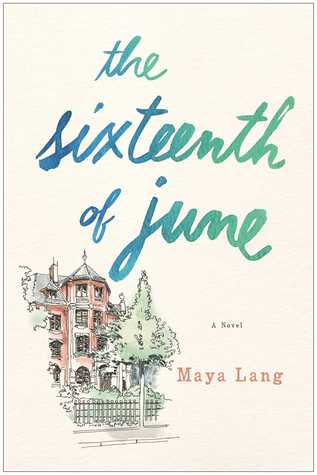 AudioBook Review
AudioBook Review
- Author: Maya Lang
- Performed by Julia Whelan, MacLeod Andrews, Will Damron
- Released: June 2014 by Brilliance Audio
- Category: Contemporary Fiction

A finely observed, wry social satire set in Philadelphia over the course of a single day, this soaring debut novel paints a moving portrait of a family at a turning point.
Clever, lyrical, and often hilarious, The Sixteenth of June is a feat of storytelling and a sharp depiction of modern American family life. It delves into the tensions and allegiances of friendships, the murky uncertainty of early adulthood, and the yearning to belong. This remarkable novel offers a nod to James Joyce’s celebrated classic, Ulysses, and it is about the secrets we keep and the lengths we’ll go to for acceptance and love.
The Sixteenth of June relates to James Joyce’s Ulysses and reflects parts of the plot and also characters’ names. I have no idea how the story pertains to Joyce’s novel, not having read it, so the implications passed me by but that fact didn’t affect my following the story or my enjoyment of the audio. Maya Lang’s dedication prior to the beginning of the story is ‘For all the readers who never made it through Ulysses (or haven’t wanted to try)’
Just as an aside (thanks to Google!)…James Joyce met Nora Barnacle in 1904 and their first date was on the 16th June that year, inspiring him to write Ulysses. The main character was Leopold Bloom. Hence the annual remembrance being named Bloomsday.
The Sixteenth of June is set in 2004 celebrating the 100th anniversary of Bloomsday with the dysfunctional Portman family. The story is told from three perspectives; Stephen Portman, his brother Leopold and Leopold’s fiancé, Nora, a trained opera singer. June and Michael Portman, the brothers’ parents, are adamant about hosting their annual Bloomsday party, regardless of Michael’s mother’s funeral being held that very morning. They give the appearance of being quite superficial and unfeeling, Michael trying to expunge his Jewish roots and June concerned mostly with her social standing.
Nora is still shaken and dealing with her grief since her own mother’s death from cancer the previous year, and attending another funeral only serves to remind her. Leo and Stephen have different reactions to the death of their grandmother.
Leo hasn’t said a word about his grandmother since they got the news. There has been no reminiscing, no look of regret while knotting his black tie that morning.
Stephen will need to gather himself today, as though he were in small pieces, a vase knocked over by a careless hand.
Stephen and Nora have been the best and closest of friends throughout their college years and Stephen can’t understand what Nora sees in Leo. There’s a slightly uncomfortable love triangle going on, both brothers loving Nora in different ways. Nora’s singing career lost momentum during her mother’s illness and subsequent death and she drifted into a relationship and engagement with Leo. All Leo wants is to please everyone, marry Nora and settle into married life but Nora is beginning to feel unsure and trapped.
Stephen, on the other hand, is cultured and into his seventh year of his PhD dissertation and feeling in a rut, unsure of the direction his life should take. He’s been visiting Hannah, his grandmother, at the retirement home Stephen feels she was forced into by his parents, irrespective of her wishes. Stephen and Hannah have grown close, she accepted Stephen for himself with no demands or assumptions and he enjoyed, and was relaxed in, her company. Hannah’s death has hit him hard.
“Not too shabby, eh?” Grandma Portman had prodded, watching him take it in when he first visited. It was the week after 9/11. He had decided to check on her after learning that his parents had no intention of visiting……
“It was good of you to come, bubeleh,” she said, squeezing his arm. They gazed at the weeping willows, the In Memoriam benches beneath. Stephen, touched by how pleased she was to see him, felt bizarrely close to tears.
This is a contemplative observation of the characters’ emotional relationships, their inner feelings, conflicts and aspirations, very cleverly laid out through the thoughts, conversations and flashbacks of the three main protagonists. The narrative unfolds quite slowly at first, this is not an action novel, more a study of the psychology and qualities of the individual. Nevertheless I was soon drawn into the story and the compelling dynamics between the Portman family and Nora.
The Sixteenth of June is quite an ambitious debut, poignant, witty, skilfully written and self-assured, weaving together past and present smoothly. At it’s core are the personas and complicated relationships of each of the characters. It delves into their struggles with love, friendship, coming to terms with the past and what the future might hold. Their efforts at trying to make sense of their lives and moving on in the right direction for each individual, bringing everything to a satisfying conclusion.
I’ve never been a real fan of dual/multiple narrations, probably because there would always be one narrator I wasn’t keen on. That doesn’t apply here, this audio has three of my favourites and works beautifully. A fabulous narration.
Book links ~ Amazon UK Amazon US
About the author
 Maya Lang is the author of The Sixteenth of June (Scribner), long listed for the 2014 Flaherty-Dunnan First Novel Prize. She received the 2012 Bread Loaf-Rona Jaffe Foundation Scholarship in Fiction, and was a Finalist for Glimmer Train’s Short Story Award for New Writers.
Maya Lang is the author of The Sixteenth of June (Scribner), long listed for the 2014 Flaherty-Dunnan First Novel Prize. She received the 2012 Bread Loaf-Rona Jaffe Foundation Scholarship in Fiction, and was a Finalist for Glimmer Train’s Short Story Award for New Writers.
The daughter of Indian immigrant parents, Lang holds a Ph.D. in Comparative Literature. Her short fiction has appeared, most recently, in VQR. Visit her website at www.mayalang.com

A wonderful review from you, Cathy.
(I was interested in your view on
more than one narrator.)
I love the sound of this story.
LikeLiked by 1 person
Thank you, June 🙂 I didn’t know what to expect from this book, it’s not my usual choice but the narrators sold it to me. It worked really with with each of them narrating from their characters’ perspectives.
LikeLike
This sounds really interesting and I love that cover 🙂 great review!
LikeLiked by 1 person
Thanks 🙂
LikeLike
Terrific review, Cathy. The book sounds really interesting.
LikeLike
Thank you 🙂 It’s very interesting. I didn’t know initially if I’d like it, it’s so different to my usual choices but it really pulled me in.
LikeLiked by 1 person
Fantastic review, Cathy. This sounds like a really intriguing read 😀
LikeLiked by 1 person
Thank you 🙂
LikeLike